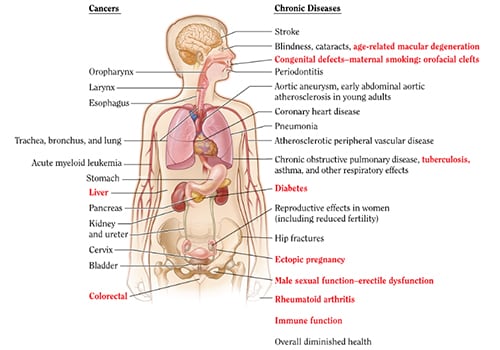Smoking: How Bad Is It?

(DetoxifySamurai) The fact that smoking is detrimental to health is widely acknowledged. Fortunately cigarette smoking among U.S. adults has fallen to the lowest rate in generations to 17% from 42% in 1965.
The largest ethnic group of smokers were American Indians/Alaska Native (29%) followed closely by multi-race individuals (27.9%). The group with the lowest amount of smokers were Asians (9.5%). By education level the largest percentage were among GED holders at 43%. Those with a graduate degree or higher represented only 5.4%. The largest age group was individuals in the 25-44 age range at 20%, the lowest was >65 at 8.5%. Among the regions the midwest had the highest percentage of smokers at 20.7% with the west being the lowest at 13.1%
Not only is there a health and economic cost to the individual but also as a nation. The total economic cost of smoking is more than $300 billion per year, including nearly $170 billion in direct medical care for adults and more that 156 billion in lost productivity due to premature death and exposure to second hand smoke.
Smoking and fertility
For Women
Studies suggest that smoking affects hormone production. This could make it harder for women smokers to get pregnant. Additionally, smoking is known to cause ectopic pregnancy, a condition in which the fertilized egg fails to move to the uterus and instead attaches in the fallopian tube. Ectopic pregnancy poses a serious risk to the mother and is fatal to the fetus. Quitting smoking before getting pregnant is best.
For Men
Recent studies show that smoking is a cause of erectile dysfunction (ED). A man with ED can’t have and maintain an erection that is adequate for satisfactory sexual performance, which can affect reproduction. Cigarette smoke alters blood flow necessary an erection, and smoking interferes with the healthy function of blood vessels in erectile tissue. Smoking also damages the DNA in sperm, which can lead to infertility or miscarriages.
The Center for Disease Control and Prevention (CDC) had done a good job of outlining the dangers of smoking and its affects on the body’s various life systems. Therefore, the article from their website is reproduced below.
The health affects of cigarette smoking.
Cigarette smoking harms nearly every organ of the body, causes many diseases, and reduces the health of smokers in general.1,2
Quitting smoking lowers your risk for smoking-related diseases and can add years to your life.1,2

Smoking and Death
Cigarette smoking is the leading preventable cause of death in the United States.1
- Cigarette smoking causes more than 480,000 deaths each year in the United States. This is nearly one in five deaths.1,2,3
- Smoking causes more deaths each year than the following causes combined:4
- Human immunodeficiency virus (HIV)
- Illegal drug use
- Alcohol use
- Motor vehicle injuries
- Firearm-related incidents
- More than 10 times as many U.S. citizens have died prematurely from cigarette smoking than have died in all the wars fought by the United States during its history.1
- Smoking causes about 90% (or 9 out of 10) of all lung cancer deaths in men and women.1,2 More women die from lung cancer each year than from breast cancer.5
- About 80% (or 8 out of 10) of all deaths from chronic obstructive pulmonary disease (COPD) are caused by smoking.1
- Cigarette smoking increases risk for death from all causes in men and women.1
- The risk of dying from cigarette smoking has increased over the last 50 years in men and women in the United States.1
Smoking and Increased Health Risks
Smokers are more likely than nonsmokers to develop heart disease, stroke, and lung cancer.1
- Smoking is estimated to increase the risk—
- For coronary heart disease by 2 to 4 times1,6
- For stroke by 2 to 4 times1
- Of men developing lung cancer by 25 times1
- Of women developing lung cancer by 25.7 times1
- Smoking causes diminished overall health, increased absenteeism from work, and increased health care utilization and cost.1
Smoking and Cardiovascular Disease
Smokers are at greater risk for diseases that affect the heart and blood vessels (cardiovascular disease).1,2
- Smoking causes stroke and coronary heart disease, which are among the leading causes of death in the United States.1,3
- Even people who smoke fewer than five cigarettes a day can have early signs of cardiovascular disease.1
- Smoking damages blood vessels and can make them thicken and grow narrower. This makes your heart beat faster and your blood pressure go up. Clots can also form.1,2
- A stroke occurs when a clot blocks the blood flow to part of your brain or when a blood vessel in or around your brain bursts.1,2
- Blockages caused by smoking can also reduce blood flow to your legs and skin.1,2
Smoking and Respiratory Disease
Smoking can cause lung disease by damaging your airways and the small air sacs (alveoli) found in your lungs.1,2
- Lung diseases caused by smoking include COPD, which includes emphysema and chronic bronchitis.1,2
- Cigarette smoking causes most cases of lung cancer.1,2
- If you have asthma, tobacco smoke can trigger an attack or make an attack worse.1,2
- Smokers are 12 to 13 times more likely to die from COPD than nonsmokers.1
Smoking and Cancer
Smoking can cause cancer almost anywhere in your body:1,2 (See figure above)
- Bladder
- Blood (acute myeloid leukemia)
- Cervix
- Colon and rectum (colorectal)
- Esophagus
- Kidney and ureter
- Larynx
- Liver
- Oropharynx (includes parts of the throat, tongue, soft palate, and the tonsils)
- Pancreas
- Stomach
- Trachea, bronchus, and lung
Smoking also increases the risk of dying from cancer and other diseases in cancer patients and survivors.1
If nobody smoked, one of every three cancer deaths in the United States would not happen.1,2
Smoking and Other Health Risks
Smoking harms nearly every organ of the body and affects a person’s overall health.1,2
- Smoking can make it harder for a woman to become pregnant and can affect her baby’s health before and after birth. Smoking increases risks for:1,2,5
- Preterm (early) delivery
- Stillbirth (death of the baby before birth)
- Low birth weight
- Sudden infant death syndrome (known as SIDS or crib death)
- Ectopic pregnancy
- Orofacial clefts in infants
- Smoking can also affect men’s sperm, which can reduce fertility and also increase risks for birth defects and miscarriage.2
- Smoking can affect bone health.1,5
- Women past childbearing years who smoke have weaker bones than women who never smoked, and are at greater risk for broken bones.
- Smoking affects the health of your teeth and gums and can cause tooth loss.1
- Smoking can increase your risk for cataracts (clouding of the eye’s lens that makes it hard for you to see) and age-related macular degeneration (damage to a small spot near the center of the retina, the part of the eye needed for central vision).1
- Smoking is a cause of type 2 diabetes mellitus and can make it harder to control. The risk of developing diabetes is 30–40% higher for active smokers than nonsmokers.1,2
- Smoking causes general adverse effects on the body, including inflammation and decreased immune function.1
- Smoking is a cause of rheumatoid arthritis.1
Health benefits of quitting
A survey of smokers in 2011 revealed that nearly 7 in 10 (68.9%) of adult cigarette smokers wanted to stop smoking and more than 4 in 10 (42.7%) adult cigarette smokers had made an attempt to quit in the past year.
- Lowered risk for lung cancer and many other types of cancer.
- Reduced risk for heart disease, stroke, and peripheral vascular disease (narrowing of the blood vessels outside your heart).
- Reduced heart disease risk within 1 to 2 years of quitting.
- Reduced respiratory symptoms, such as coughing, wheezing, and shortness of breath. While these symptoms may not disappear, they do not continue to progress at the same rate among people who quit compared with those who continue to smoke.
- Reduced risk of developing some lung diseases (such as chronic obstructive pulmonary disease, also known as COPD, one of the leading causes of death in the United States).
- Reduced risk for infertility in women of childbearing age. Women who stop smoking during pregnancy also reduce their risk of having a low birth weight baby.
Ways to Quit Smoking
Most former smokers quit without using one of the treatments that scientific research has shown can work. However, the following treatments are proven to be effective for smokers who want help to quit:
- Brief help by a doctor (such as when a doctor takes 10 minutes or less to give a patient advice and assistance about quitting)
- Individual, group, or telephone counseling
- Behavioral therapies (such as training in problem solving)
- Treatments with more person-to-person contact and more intensity (such as more or longer counseling sessions)
- Programs to deliver treatments using mobile phones
Medications for quitting that have been found to be effective include the following:
- Nicotine replacement products
- Over-the-counter (nicotine patch [which is also available by prescription], gum, lozenge)
- Prescription (nicotine patch, inhaler, nasal spray)
- Prescription non-nicotine medications: bupropion SR (Zyban®), varenicline tartrate (Chantix®)
Counseling and medication are both effective for treating tobacco dependence, and using them together is more effective than using either one alone.
References
- U.S. Department of Health and Human Services.The Health Consequences of Smoking—50 Years of Progress: A Report of the Surgeon General. Atlanta: U.S. Department of Health and Human Services, Centers for Disease Control and Prevention, National Center for Chronic Disease Prevention and Health Promotion, Office on Smoking and Health, 2014 [accessed 2015 Oct 5].
- U.S. Department of Health and Human Services. How Tobacco Smoke Causes Disease: What It Means to You. Atlanta: U.S. Department of Health and Human Services, Centers for Disease Control and Prevention, National Center for Chronic Disease Prevention and Health Promotion, Office on Smoking and Health, 2010 [accessed 2015 Oct 5].
- Centers for Disease Control and Prevention. QuickStats: Number of Deaths from 10 Leading Causes—National Vital Statistics System, United States, 2010. Morbidity and Mortality Weekly Report 2013:62(08);155. [accessed 2015 Oct 5].
- Mokdad AH, Marks JS, Stroup DF, Gerberding JL. Actual Causes of Death in the United States. JAMA: Journal of the American Medical Association 2004;291(10):1238–45 [cited 2015 Oct 5].
- U.S. Department of Health and Human Services. Women and Smoking: A Report of the Surgeon General. Rockville (MD): U.S. Department of Health and Human Services, Public Health Service, Office of the Surgeon General, 2001 [accessed 2015 Oct 5].
- U.S. Department of Health and Human Services. Reducing the Health Consequences of Smoking: 25 Years of Progress. A Report of the Surgeon General. Rockville (MD): U.S. Department of Health and Human Services, Public Health Service, Centers for Disease Control, National Center for Chronic Disease Prevention and Health Promotion, Office on Smoking and Health, 1989 [accessed 2015 Oct 5].






